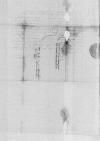List #5697
Sigismund I Jagiellon do Ioannes DANTISCUSCracow, 1539-07-05
| odebrano 1539-07-15 Rękopiśmienne podstawy źródłowe:
Pomocnicze podstawy źródłowe:
Publikacje:
| ||||||||||||
Tekst + aparat krytyczny + komentarzZwykły tekstTekst + komentarzTekst + aparat krytyczny
Reverendo in Christo Patri, domino
Reverende in Christo Pater paper damaged⌈[Pater]Pater paper damaged⌉, sincere nobis dilecte.
Quod attinet ad dignitates, si non ante fuiss paper damaged⌈[ss]ss paper damaged⌉ent eae per nobis distributae, quam cf.
Bene valeat Paternitas Vestra.
Dat(ae) or Dat(um)⌈Dat(ae)Dat(ae) or Dat(um)⌉
Ad mandatum regiae maiestatis proprium


 BNW, BOZ 953, f. 173v.
BNW, BOZ 953, f. 173v.